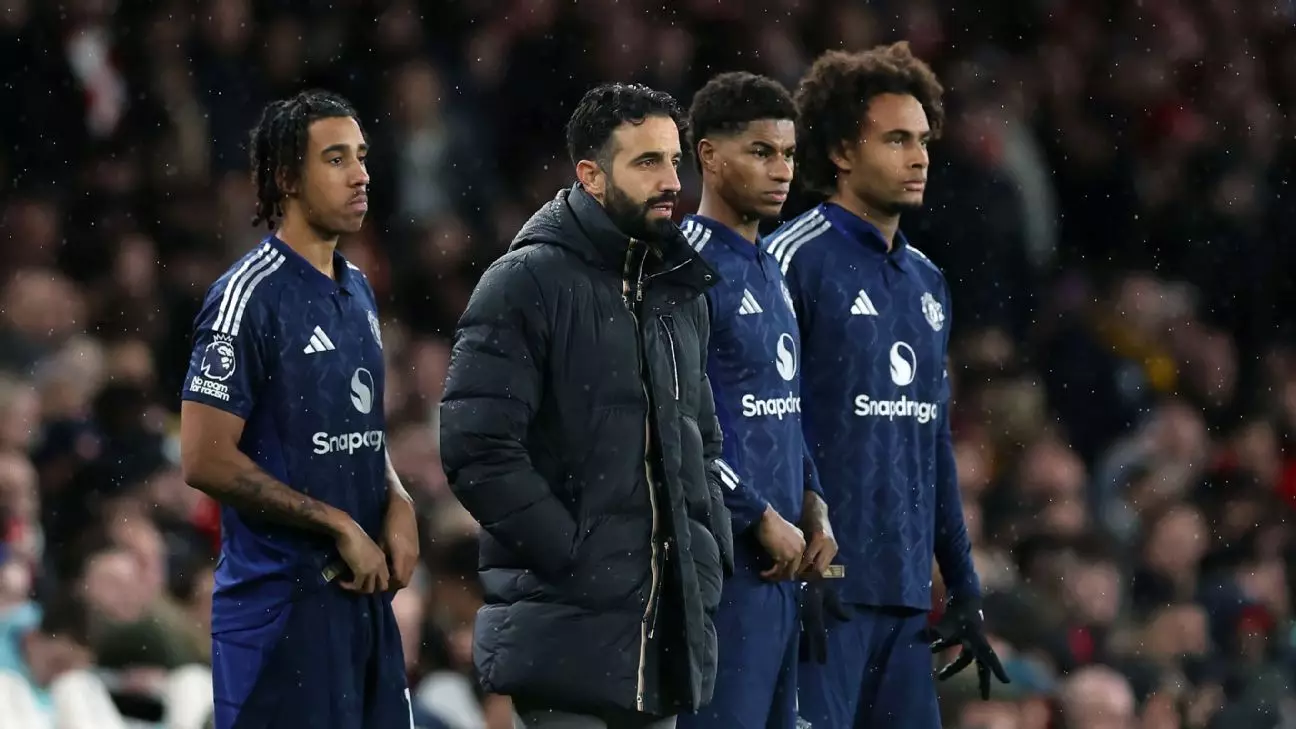Ruben Amorim’s tenure as head coach of Manchester United has commenced amidst considerable adversity. Suffering a 2-0 defeat to Arsenal in his debut league match, Amorim not only faced the harsh realities of top-flight football but also the daunting challenge of fielding a squad beleaguered by injuries. Goals from Jurriën Timber and William Saliba, both capitalizing on corner kicks, highlighted the Gunners’ capability to seize opportunities, but they also unveiled weaknesses within United’s defense that Amorim will need to address urgently.
This loss marked not just a scoreline but a significant psychological barrier for Amorim, as it signified his first league defeat in over a year, a stunning transition from his success at Sporting CP. The stakes are high in a club like Manchester United, where recovery from defeat must be rapid, especially in a league characterized by its cutthroat competition.
The injury crisis at Manchester United presents a significant hurdle for Amorim. He has publicly acknowledged the limitations imposed on his player management due to their fitness levels. For instance, crucial players like Harry Maguire, Tyrell Malacia, and Mason Mount were forced to leave the pitch early due to recent injuries, exhibiting the precarious balance of pushing players while ensuring they do not exacerbate their conditions.
Amorim’s strategy reflects a profound understanding of modern sports science, recognizing that player fitness must dictate tactical decisions. His revelation about the “time limits” for players under injury management indicates a necessary shift in coaching philosophy—one that balances immediate competitive needs with long-term athlete well-being. With the recent debut of Leny Yoro—returning from a long-term foot injury—this situation reflects not only on individual players but also on the entire squad’s depth and readiness.
Despite the unfortunate result, Amorim remains resolute in extracting positives from the experience. His comments indicate a reflective approach to coaching, as he recognizes the importance of focusing on performance metrics rather than being solely swayed by the outcome. Amorim’s evaluation focuses on the players’ attitudes and efforts throughout the match, which is crucial when attempting to build a cohesive team.
In a game where momentum is everything, Amorim identified the shifting tides of pressure that can dictate match outcomes. Even amid disappointment, he noted moments when his side managed to unsettle Arsenal, indicating that they were not wholly outplayed. Such insights are vital for his development as a coach, allowing him to refine tactics and game management based on real-time assessments rather than just the final score.
As United navigates their challenging early-season phase, the rehabilitation of key players becomes integral. With Luke Shaw sidelined once again after completing a lengthy injury recovery, Amorim’s commitment to giving Shaw the necessary time to regain full fitness underscores a major theme in his management style: patience. He recognizes not only the technical qualities Shaw brings to the side but also the emotional and psychological ramifications of injury on players.
In an era where the demand for immediate results can compromise injury recovery protocols, Amorim’s deliberate strategy of prioritizing fitness over rushed returns showcases a refreshing approach. His ongoing support for Shaw exemplifies the kind of environment he aims to foster at Manchester United; one built on trust, understanding, and long-term vision rather than instant gratification.
Looking beyond this defeat, the pathway for Amorim at Manchester United is laden with potential learning curves. He possesses a unique opportunity to instill resilience and tactical acumen into a squad facing its own challenges. Balancing immediate performance with thoughtful player management will be crucial in the coming weeks as he navigates the demanding pressures of Premier League management.
Ultimately, Amorim’s journey at Manchester United may become defined by how he uses this experience to rejuvenate and strengthen the team. As he settles into this challenging yet prestigious role, fans and observers alike will be keenly watching how he transforms setbacks into growth opportunities, hoping to align his vision with the storied legacy of Manchester United.

